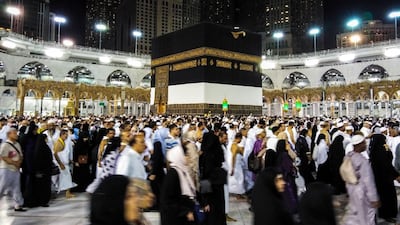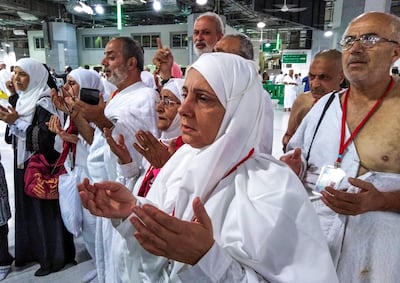Humanity is on display as two million people descend on the Saudi Arabian city of Makkah for the annual Hajj, which starts on Sunday, to retrace the steps of Prophet Mohammed's last pilgrimage before his death in 632 CE.
Although the pilgrims arrive by the planeload from almost every country, every one is wearing the same – two cloths wrapped at the waist and shoulders for men, and a simple garment not covering the face for women.
The clothes symbolise equality among all Muslims as they come to face God on the holiest pilgrimage.
The excitement of the crowds arriving in Jeddah was expressed in a myriad of languages, as passengers from Mumbai, Abu Dhabi and Jakarta waited in the immigration line at the King Abdulaziz International Airport.
But the languages of Indonesia, India and Bosnian gave way as the pilgrims joined together in a swelling prayer at the Hajj terminal. Together, they chanted “Labaik Allahuma labaik”, Arabic for, “Here I am, God, here I am.”
The prayer encapsulates Hajj for so many as they come to gain acceptance from God.
Performing a successful Hajj is a transformative event for millions each year, spiritually its competition fulfils the last pillar of Islam – increasing pilgrims' chances for passage to paradise after death. But the journey is also important socially as it elevates rank for many who gain the honorific of Hajji, or one who has performed Hajj.
But even among those not undertaking the pilgrimage, the sense of occasion is still great.
The taxi driver from the airport into Makkah did so with one hand on the wheel and the other gripping prayer beads, whispering incantations during the very long drive to the Holy City.
He was interrupted by the three checkpoints on the 100-kilometre road from Jeddah to Makkah as officers looked at papers to ensure the car was carrying only some of the two million pilgrims granted permission to attend.

“It’s changed a lot, it’s become more organised, safer in many cases. The fines for trying to do Hajj without a permit is 20,000 riyals (Dh19,500),” the driver said, “but I am still going to sneak in to do it a seventh time”.
Despite his bravado, Saudi Arabia has undertaken a monumental effort to bring order to the chaos. But that organisation still needs time. Hajj, as an event, is adjusting to modern times and many aspects of the past remain.
Convoys of buses ferrying hundreds of thousands around the city will make unplanned stops for groups enough large and eager enough to appeal to the drivers’ generosity.
At the Kaaba itself, just after the Isha prayers, many pilgrims go to perform the Umrah ritual before embarking on the Hajj. The first step requires approaching the Kaaba, and circumambulating it seven times, symbolising the devotion to one God.
______________
Read more:
Follow live updates from Hajj 2018
Hajj 2018: bringing technology to the millennia-old pilgrimage
From mosques on Mars to meeting Martians: the dilemmas awaiting Muslims in space
Exhibition celebrating mosques from around the world opens in Dubai
______________
Measures have been taken to make the pilgrimage more comfortable during the hot summer of Makkah. Fans blow from the ceilings and from tall stands, spreading a mist shower.
The temperature inside the Sacred Mosque is significantly cooler. But a certain heat radiates from the Kaaba itself, as hundreds of pilgrims pack in for a chance to come as close as possible to the holiest site in Islam. Even the air-conditioned marble of the Sacred Mosque is warm underfoot.
The circumambulation carries everyone in a wave of movement, people making the rounds reach a certain understanding but attempting to get closer to the Kaaba could be blocked with a gentle hand.
The heat and emotions reach a fever pitch at the Eastern Corner, holding the Black Stone, which worshippers believe was placed there by the Prophet Ibrahim after an angel brought it to him almost 4,000 years ago.
Pilgrims move forward to kiss the stone and recite their most intimate prayer at the corner. But the sheer size of the crowds gathered around can mean getting close involves a flurry of shoves and jabs as others jockey for position towards the corner.
A group of Indonesian pilgrims begin to cry as they surround the Black Stone. They are brought back into prayer as their tour guide asks them to recite after him.
However, the perfumed Kiswah, the silk and gold embroidered cloth covering the Kaaba at the cost of 17 million riyals (Dh16.6 million), covers the smell of sweat from the swaying body of pilgrims around the Kaaba.
Moving away from the Kaaba is an easier matter than walking forward. Just steps back from the continuously moving crowd, the spaces open up to reveal the skyline covered in cranes and construction – part of the Saudi government's plans to create a more hospitable pilgrimage.
A sense of camaraderie permeates every daunting undertaking of the pilgrimage. At a pharmacy a few minutes walk from the Sacred Mosque, packed almost as tightly as the circumambulating crowd, I am asked to help a mother reach nappies for her young daughter.
Outside, a man donates his slippers to another who has lost his during the hours of walking – it is not uncommon to find pairs of sandals lost or discarded on the floor.
Both the government and pilgrims hand out food to those in need, and for every person in need there are many extended helping hands.
Hajj, the teeming mass of humanity brought together with singular purpose despite the chaos and heat, unites millions in the quest to gain acceptance from God.












